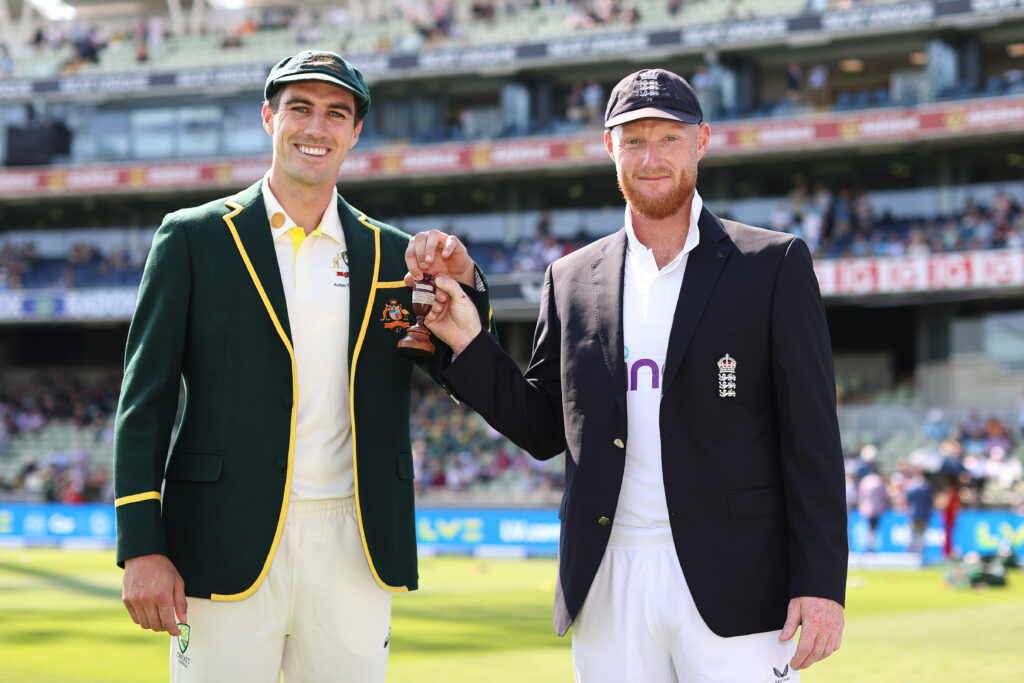A history of the Australia v England sports rivalry
The Aussie/Pommie feud extends beyond disciplines and dates back centuries. Let’s take a look back at the rivalry’s fiercest moments.

WHEN THE Matildas face the Lionesses tonight, the match won’t simply be a battle for a place in the 2023 FIFA Women’s World Cup final, it will also write the next chapter in the historic rivalry between Australia and England.
Australia and England’s fierce sporting rivalry is unmatched in stature and animosity. Unlike most rivalries, the Aussie/Pommie feud extends across sporting codes, has its roots in centuries-old colonial relations, and is strengthened by the fact that both nation’s identities are built on ultra-competitiveness. To understand how seriously both nations take their sports, you’ll only need to observe the attitudes of their citizens tomorrow morning. Where one nation will be ecstatic in celebration following tonight’s World Cup clash, the other will undoubtedly be dejected in defeat.
Despite both nations regularly making waves at football’s biggest tournaments, Australia and England have never met in a men’s or women’s FIFA World Cup. England, always ranked amongst footballs elite, usually have bigger rivals in Europe and South America. While Australia, who are in the Asian confederation, typically find Japan, or our antipodean neighbours New Zealand, as our foremost foes. Nevertheless, the rivalry endures, as both sides have still had plenty of tenuous contests.
The last time the Matildas played England was April of this year, when Sam Kerr scored in a 2-0 win that still stands as England’s only loss under head coach Sarina Wiegman. The Matildas also dispatched Great Britain in the quarterfinals of the 2020 Olympics in a 4-3 extra time thriller—which, while technically not against England per se, we’re certain left plenty of English fans upset.
It’s clear that there’s more than a place in the final on the line when the Matildas take on England tonight. For the uninitiated outsiders gazing with wonderment at the hostility sport engenders between Australia and England (who, otherwise, enjoy superbly friendly relations), or for the more well-versed fans looking to restoke the flames of the feud, allow us to recount a brief history of the Australia v England rivalry, or rather, a beef history (excuse the terrible pun).


Pre-20th century: the origins of the Australia v England rivalry
We’re going to assume you’re already at least moderately familiar with Australia’s colonial past as a subject of the British Empire, which laid the foundation for a tenuous relationship in the sporting arena, if not on the geopolitical stage. The two nations habitual sporting rivalry began almost immediately after organised sport first came to the great southern land, when in 1877, the first ever Test cricket match was played between England and Australia, in Melbourne.
In 1882, cricketing contests began to heat up after the first Ashes was won by Australia in London. Following the Aussie victory, The Sporting Times published a mock obituary for English cricket, which included the now notorious phrase “the body will be cremated and the ashes taken to Australia.” Since that fateful day, the nations’ men’s teams have met every few years to compete for a (miniscule in size but enormous in prestige) terracotta urn.
To a nation of people who had for so long felt they had been cast aside as second-rate citizens of the British Empire (not for nothing mind you, as Australians at the time were mostly descended from convicts) the snotty colony’s triumph over the supposedly superior mother country represented Australia’s sudden ascension to the world stage and sparked the premise of the enduring rivalry, and dreams of federation—which was achieved less than 20 years later.

1900-1950: allies on the battlefield, enemies on the sporting field
Australia answered England’s call to arms in the First and Second World Wars, but while England could always depend on Australia as a reliable military ally, their sporting relationship in the interwar years was anything but cordial.
As the infamous proclamation from English Bowler Bill Voce goes: “If we don’t beat you, we’ll knock your bloody heads off.” That statement sums up perhaps the most notorious Ashes series ever, the Bodyline series, which took place from 1932-33.
Australian cricketer Don Bradman was so indescribably talented as a batsman at the time that England decided the only way they could win The Ashes was to bowl at Bradman and his teammates bodies rather than the stumps and hope the Australians would protect themselves rather than hitting sixes. After being hit across the chest with one particularly nasty delivery, Australian batsman Bill Woodfull uttered: “There are two teams out there. One is trying to play cricket and the other is not.” Dubious sportsmanship aside, England’s strategy worked, they won the series 4-1.
Around the same time as the bodyline series, England’s passion for sports (and for pompous showcases of power) reached its pinnacle with the establishment of the Commonwealth Games in 1930. Australia and England have finished atop the medal table in all but one edition of the games, although Australia is the more successful of the pair, with 1003 total gold medals to England’s 773. Interest in the Games may have waned as the Empire’s power has dwindled, but Australia’s dominance certainly hasn’t, with the nation finishing first on the medal table in eight of the last nine occasions.
1950-2000: Expansion into more disciplines
There is more to the Australian/English rivalry than cricket. In rugby union, the notorious ‘Battle of Ballymore’ of 1975 took place in Brisbane, which was basically an 80-minute brawl with brief smatterings of rugby in between. A similar outing occurred in 1989 with the second ‘Battle of Ballymore’, which was described by a player as “the most violent game of rugby that has ever been played”. Beyond the brawls, Australia beat tournament hosts England on their home turf in the final of the 1991 World Cup, and England returned the favour in an Australian hosted final in 2003.
The 90s were when pop culture truly took flight, and when Australian Greg Norman and Englishman Nick Faldo dominated the golfing circuit. Norman sat atop the world rankings for most of the decade, but Faldo raked in significantly more Major’s. The defining moment of this rivalry, which remains unfriendly to this day, came at the 1996 Masters. Norman, in a manner that gave credence to his reputation as a serial choker, blew a six-shot final-round lead to eventually lose to Faldo, who later said: “I genuinely feel bad for Greg.” With such condescension perhaps worse than the loss itself.
21st century: the rivalry endures to this day
Almost a quarter way through the 21st century and the Aussie/Pommie rivalry hasn’t died down one bit. The Ashes tradition has continued and in recent years has become increasingly controversial. This year’s series was as thrilling as it was riddled with drama. After accusing Australia of playing in a manner that wasn’t in the “spirit of the game”, England came from back from 2-0 down to salvage a draw, stoking the flames of the rivalry once more.
Netball is a sport that Australia has always dominated. With the best national teams mostly comprised of current and former nations of the Commonwealth, it’s inevitable that Australia and England meet fairly regularly—and Australia almost always comes out on top. Most recently when Australia defeated England to win the 2023 Netball World Cup, just when the English started to get their hopes up.
Tonight’s FIFA World Cup semi-final is not just another match, it’s the culmination of decades of historic rivalry’s coming to a head. Matildas goalkeeper Lydia Williams has called the clash “just another game”, and England midfielder Keira Walsh has echoed that sentiment. Presumably, the players are trying to downplay the match’s importance to calm their nerves, but the rest of us can recognise it for what it really is: the next showstopping chapter of an enduring rivalry that will continue into perpetuity.

Related:























